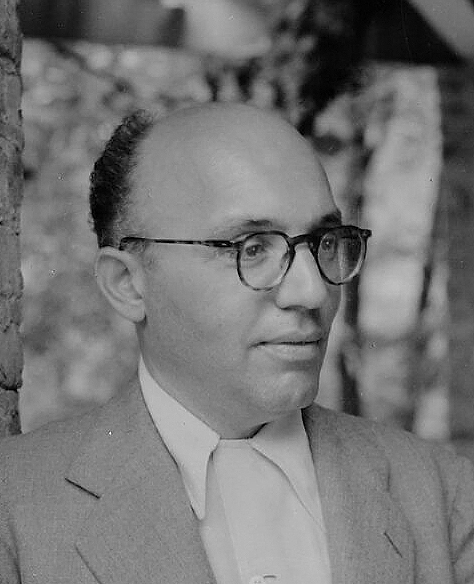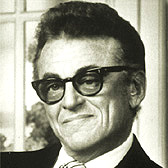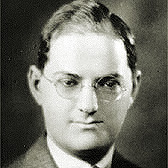
Internationally acclaimed stage and classical composer
Kurt Weill
InducteeWith Berthold Brecht wrote "The Threepenny Opera" a perennial for 60 years
Kurt Weill was born in Dessau, Germany on March 2, 1900. He was the son of a cantor and began composing and performing while still a child. By the time he was twenty he was coaching opera and conducting theater bands until he moved to Berlin in 1920, where be became a student of the renowned Ferruccio Busoni and began his career as part of Berlin's young classical avant garde. He supported himself through a variety of musical activities, including tutoring the young Maurice Abravanel, who was later to conduct the premieres of many Weill works, including most of his Broadway scores. Another student in this period was the young Claudio Arrau who was later to be acclaimed as one of the greatest concert pianists of the century.
In spite of his roots in the avant garde, both his esthetic and his left-wing political convictions soon led Weill to feel that it was essential for his music to appeal to a broad general audience and he began to work primarily in the musical theater. His early opera Der Protagonist (1926), with a text by playwright Georg Kaiser, attracted great attention. This was followed by Royal Palace (1926), an early mixed-media work with a text by Iwan Goll that included film and dance. In 1927 came another work with Georg Kaiser, Der Zar Idsst sich photographieren.
Weill’s most important German works were those done in collaboration with Bertolt Brecht. In 1927, they created a brief "songspiel" Mahagonny, which became a hugely controversial success, and in 1930, they expanded it into a full-length opera Aufstieg und Fall der Stadt Mahagonny. Their greatest success together was 1928's Die Dreigroschenoper. This was a major hit in Germany, although at the time it received relatively little notice internationally.
Eventually, Weill became unhappy in his collaboration with Brecht, and in 1931 he wrote Die Burgschaft with a text by the stage designer Caspar Neher. He worked again with Georg Kaiser on 1932's Der Sibersee. In the works of his Berlin period, Weill developed a style in which popular music elements, especially American dance idioms, were subtly and ironically distorted to powerful artistic effect. However, Germany was rapidly becoming an inhospitable place for a left-wing Jew. As the Nazi party became prominent, the Nazis specifically targeted Weill, denouncing him and even staging riots at performances of his works. When the Nazis carne to power in Germany in 1931, the attacks on Weill accelerated, and on March 21 he fled the country. The Nazis banned his music, and it was not heard again in Germany until after World War 2.
In 1926 he had married Lotte Lenya, who was to become a legendary actress and singer starring in both Mahagonny and Die Dreigroschenoper. By 1933, however, they were in the midst of getting divorced, and when Weill fled to Paris, she went to Vienna.
Weill was already an artistic celebrity in Paris when he arrived there, and quickly went to work on a number of musical projects. Soon after his arrival, he was approached to write a piece for choreographer George Ballanchine's new company Les Ballets 1933. This led to one final collaboration with Brecht, Die sieben Todsunden. Lenya came to Paris from Vienna to star in the piece, and it was conducted by Weill's former student Maurice Abravanel.
In September of 1935, Weill and Lenya, still divorced, went together to America to work with the German director Max Reinhardt on Franz Werfel's massive spectacle Der Weg der Verheissung. In the midst of several production delays, Weill had begun searching out the most creative figures in the American theater to discuss possible collaborations. He made contact with the Group Theatre, and wrote Johnny Johnson for them, with a book and lyrics by the Pulitzer Prize winning playwright Paul Green. In 1937, a reworked version of Der Weg der Verheissung finally opened under the title The Eternal Road.
From the time of his arrival in America, Weill thought of himself as an American, becoming a citizen as quickly as regulations allowed. His goal became to write "democratic" American music and within an amazingly short time, Weill learned to write in the popular American style. In collaboration with some of the most sophisticated lyricists of the day, Weill produced a series of musicals for Broadway. 1938's Knickerbocker Holiday, written with Maxwell Anderson, was a modest success and included "September Song". Then, in 1941, Lady in the Dark, with a book by Moss Hart and lyrics by Ira Gershwin, was a major hit introducing “My Ship” and The Saga of Jenny". Weill scored another huge hit in 1943 with One Touch of Venus, which had a book by S.J. Perelman and lyrics by Ogden Nash. This was followed by 1945's The Firebrand of Florence with lyrics by Ira Gershwin.
In 1947 came his most ambitious American work, a full-fledged opera for Broadway, Street Scene, adapted from the play by Elmer Rice, with lyrics by Langston Hughes. This production was followed by Love Life with book and lyrics by Alan Jay Lerner (1948). And then in 1949 came Lost in the Stars with a book and lyrics by Maxwell Anderson adapted from Alan Paton's novel about the South-African situation “Cry, the Beloved Country”.
Weill died prematurely in New York just after his 50th birthday, on April 3, 1950. Four years after Weill's death, Marc Blitzstein's English-language version of Der Dreigroschenoper became a hit off-Broadway in New York as The Threepenny Opera, starring Lotte Lenyz, sparking a revival of interest in Weill's work.
Weill's greatest populat song in America was undoubtedly "Mack the Knife", originally written in German (with Brecht for Die Dreigroschenoper) and adapted into English Lyric Version by Marc Blitzstein. Other important songs by Weill include "Pirate Jenny" also from the Threepenny Opera, "Surabaya Johnny" from Happy End (1929); "The Alabama Song", originally written with a pidgin English lyric by Brecht as part of the German opera Aufstieg und Fall der Stadt Mahagonny (1930), and "Lost in the Stars" from Lost in the Stars.



